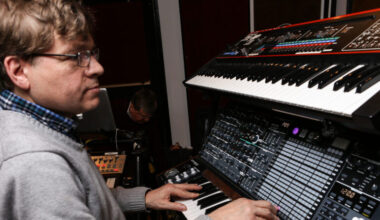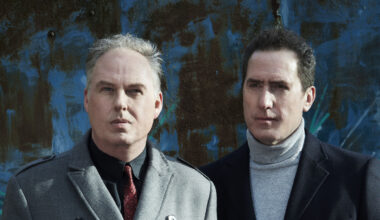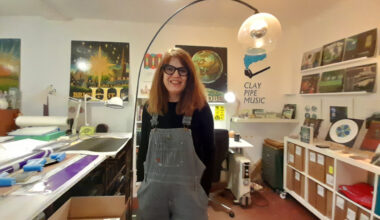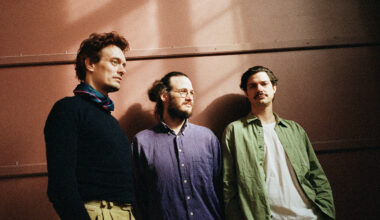Percolating endless ideas, racking up aliases, running multiple labels and still serving up groundbreaking releases, Coldcut are marking 30 years at the coalface with a renewed vigour. Matt Black and Jonathan More step into 2017 full of new music, coming your way on their original, newly revived Ahead Of Our Time imprint…
A voice from the other side of the door says that we’ll do the interview from Matt Black’s studio upstairs in Ninja Tune’s south London HQ. The voice belongs to Jonathan More who says that his studio is too messy.
Quite what state More’s studio is in beggars belief, since Black’s room is borderline chaos. Next to my elbow is what looks like an old scanner, along with various other bits of vestigial apparatus of questionable utility.
Black’s space is less a studio and more a workshop. What could be a covered-up mixing desk in one corner and some cushions in the shape of the Roland TB-303 on the sofa are perhaps the only clues that music may have been made in this room.
Finding out that the brains behind Coldcut operate out of separate studio spaces, on different floors of Ninja’s achingly cool office space, is a lot like that moment where you find out that your grandparents sleep in separate bedrooms. While they might appear joined at the hip, in fact they spend a lot of time working independently.
On the verge of celebrating 30 years as an innovative musical unit, Coldcut marked their return late last year with ‘Only Heaven’, an EP featuring regular collaborator Rodney Smith (aka Roots Manuva). It underlines their reputation as being forever on the cutting edge of electronic music, and serves as the start of what promises to be a busy year for the duo. In addition to a seven-inch boxset, a long overdue collaboration with Adrian Sherwood’s On-U Sound and a possible reggae project, the pair have relaunched their original label, Ahead Of Our Time, which was home to their very first releases at the back end of the 80s.
Ninja Tune’s offices are located in an old stable building in Kennington that forms part of the Duchy of Cornwall’s estate, the hereditary land owned by the Prince of Wales dating back to 1337.
“It means that if we ever discover gold or oil, it belongs to him,” chuckles More, making a cup of tea in a massive mug, a flat cap perched on top of his head and a Studio 1 T-shirt proudly displaying his love of dub and reggae.
More is relaxed and engaging, despite being jet-lagged after travelling back from a funeral in Phoenix. His laidback demeanour is in marked contrast to Matt Black who is prone to bursts of rapid philosophising, which is both erudite and impressively original. Like More, he does a lot of smiling, but his smile usually comes as he sinks back into the sofa after making an observation or point.
The recent EP, featuring the aforementioned Roots Manuva along with in-demand songstress Roses Gabor, includes a track called ‘Donald’s Wig’. At first glance it seems like a prescient and slightly wry statement on the new president.
“Roses’ lyrics are nothing to do with Donald Trump,” says More. “I thought it was about staring at the sun and redemption, but when I asked her she laughed and told me it was about a sad old man with a prostitute in a park, hence the sweaty, wig-wearing Donald. It wasn’t specifically written about Donald Trump, but it’s nice the way the world helps you with timing and synchronicity.”
“Perfect timing for the end of the world, you mean?” quips Black.
In addition to the planned releases this year, they will also step up their activist activities, and Black talks at length about some of the charities and lobbying organisations he spends a chunk of his time supporting. He’s quick to stress that politics have been part of Coldcut’s approach since the very beginning.
“We’ve always said that we like music to be about something,” he asserts. Black hints that a version of Gary Clail/On-U Sound System’s ‘Privatise The Air’ might be among the upcoming Coldcut releases, forming part of the collaboration with On-U. It’s a collaboration that is clearly very important to Black.
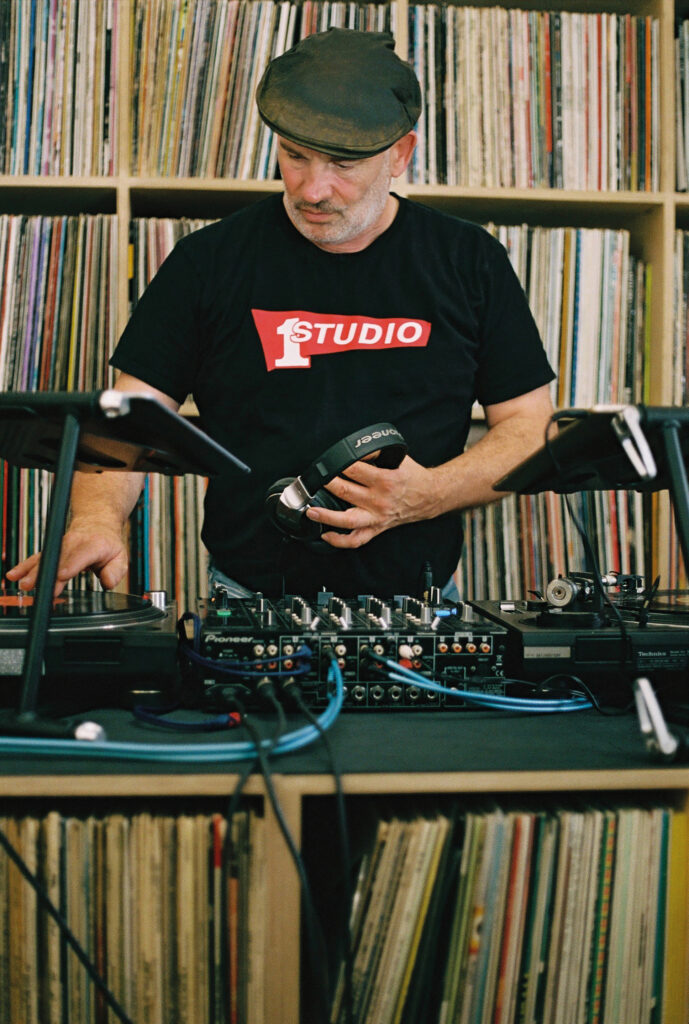
“On-U is a precursor to Ninja Tune,” he suggests. “We were very inspired by that label, it was one of the first UK independent labels to have a strong identity. That’s definitely in our DNA. Politics was also heavily in there with Mark Stewart & The Maffia and Tackhead. We grew up with that influence.”
“If you look at a track like ‘Timber’ from ‘Let Us Play!’, for example, for me that’s the best political expression we’ve managed,” adds More, “It’s not overt, but I suppose the fear is that you’re going to get criticised, particularly these days.”
“I don’t care if people criticise what we do,” says Black, firmly. “Some of our material is more overtly political. ‘Aid Dealer’ on the ‘Sound Mirrors’ album, which is about dealing aid and armaments at the same time, has got a very clear message. If you look at the track ‘Only Heaven’ on the EP, the lyrics are quite opaque and subjective. You can draw things out of Rodney’s stream-of-consciousness, but it’s guarded. Poetry isn’t clear-cut. That’s why it’s not like algebra.”
Coldcut’s latest musical adventure will once again be delivered via their Ahead Of Our Time label, the imprint they started together back in 1987, but which fell dormant in the wake of Ninja Tune’s arrival in 1990.
“It just felt like it was the right time to bring it back,” says More. “Matt and I felt like we wanted to have a space where we could just fuck about, and not affect the progress of Ninja.”
“It’s actually something that’s happened in Ninja before,” adds Black. “There’s this cyclical opening-out to be eclectic, and then finding that it confuses some people, and then narrowing it down to be more focussed. We used to have NTone, which was a more experimental label, and then we thought we didn’t really need that. Then we found it was convenient to have Big Dada for rap, and Counter for more rocky stuff.
“But I’ll be blunter about it. We started Ninja as a company to release our own music, and it’s become quite a big company. It employs 50 people. It’s interesting to see your child grow up and become a strong adult that doesn’t necessarily do what you say. Quite often there have been conflicts between Coldcut and Ninja Tune, so we found that it was convenient to have Ahead Of Our Time so that we could freely release stuff. I’m quite happy with the idea of putting stuff out on Ahead Of Our Time that’s purely digital. I’d much rather have a track alive on the web rather than just sitting on my hard drive for the next 10 years.”
To physical music purists, Black’s view might be difficult to accept, but it comes from a well-reasoned place.
“Not everything needs to have a vinyl or CD release,” he says. “They’re luxuries, like a lot of physical things. I do love vinyl, but I feel like I can do more on my phone with our Ninja Jamm app than with a turntable nowadays.”
More still loves vinyl, a fact he states then pauses, wondering if Black will react. He doesn’t, so More continues.
“It’s a format that I’ve always loved,” he says. “I’ve started being asked to do seven-inch vinyl-only sets, having not really played those sets since the late 80s. Seven-inches don’t crash, the only thing you can get wrong is to put the wrong side on, and that’s about it. It’s just a box of singles and a turntable. Bosh. Done. I’m really enjoying that.”
“Everything has its joy,” says Black in a considered response. “I love hearing vinyl DJs play. I remember seeing Jon do a set at a big party somewhere and he’d only got one seven-inch centre, so he picked up the centre out of the record that was revolving, and then put it down into the other one. I was really quite impressed by that.”
More looks a little bashful at this compliment.
“He won’t need to do that anymore because Coldcut are making our own vinyl seven-inch centres with the Coldcut logo,” adds Black.
In a moment of self-deprecation, Matt Black describes the pair as “Oldcut” during the interview. Almost 30 years on since the wild soundclash single that was ‘Say Kids, What Time Is It?’, the pair are clearly music veterans. They bonded initially over a love of the same records coming out of the US, common ground despite quite different backgrounds: More the art student and Black the computer programmer. Nevertheless, the leap from loving the same records to becoming celebrated DJs and then making one of the most devastatingly original and confounding singles in music history does require a little bit of explanation.
“It’s very simple,” suggests Black. “You hear something you like, and you think, ‘I want to do that’. The things we heard were Double Dee & Steinski’s ‘Lessons’, Grandmaster Flash’s ‘… Wheels Of Steel’ and various disco edits. At the time, only a few people knew about them, it felt like it was secret knowledge. We wanted to learn how to do it and we were in the right place to do that.”
“It was art you could dance to,” says More, sagely, and he is of course 100 per cent correct. Hip hop and sliced-together records may have felt like an urban movement, but it also had its roots and parallels in the cut-ups of the likes of William S Burroughs and radical artists like Robert Rauschenberg who saw the potential of cultural appropriation. It was a form of musical collage that More could relate to from his days at Goldsmiths. Indeed, it’s More’s art school years that illustrate the insouciance and rebelliousness at his core.
“The first dissertation I did was about kitsch,” he says. “They said you had to do it on a specific size of paper that you could only buy from the college, which immediately fucked me off. So I went out and I bought one of those really kitsch photo albums and I filled it with things. I did a whole thing about denim. I cut out a pocket from the back of the trousers, typed up my dissertation and put it inside the pocket, and stuck that in the book. I did loads of stuff like that. They failed me, which was great.”
“You can see where Coldcut’s orneriness comes from,” laughs Black. “It has a long history. Fuck the system! I unfortunately don’t have so many good renegade stories. My rebellion is more internal.”
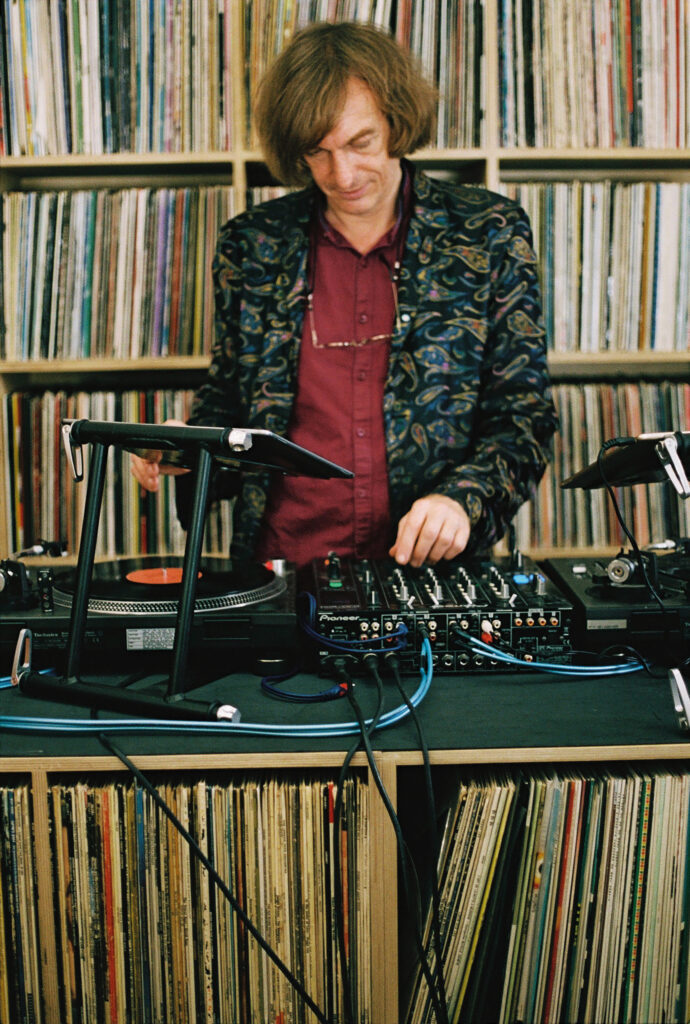
In a world where labels like Ninja Tune can produce a popular series of apps that make the process of making electronic music more accessible, it’s tempting to think that the art of making a track like ‘Say Kids, What Time Is It?’ was a much more complicated affair.
“We had two decks, a mixer, a four-track cassette deck and a pause button,” says Black. “What you could do was pretty limited. Once you’d made a decision, you had to stick to it because you couldn’t go back. You had to get it right as you went along, and you had to live edit using hip hop DJ techniques. The turntable’s a great interface for manipulating sound.
My friends and I used to do these edits with pause buttons and we were constantly try to out-compete each other. We’d sit around judging each other’s edits, going ‘Late!’ if you’d missed the timing by a tiny amount. Guess the bpm, that was another one. I’m pretty good at that. I define it as being able to get the beat within one bpm. Proper musicians have perfect pitch, but we have perfect beat.”
“It amazed me the way that Matt could mix,” says More, admiringly. “When we were playing together in clubs, I’d often just select fairly disparate stuff and hand it to him. He’d force them together and then keep them together. It’s a proper skill.”
“The Wild Bunch were a big early influence,” adds Black. “They were streets ahead of anything that was going on in London, and I remember challenging Nelly Hooper on the decks and being humiliated. Competition and co-operation are the yin and yang of evolution, but there was also a camaraderie. We were all sharing a special thing, and competing within it.”
Mark Moore from S’Express has said that in the second half of the 80s there was a race on, and that Coldcut won. While the pair like that praise, they’re keen to stress that they don’t believe that ‘Say Kids, What Time is It?’ was some sort of first.
“There was no ‘first’,” says Black, bluntly. “Jay Strongman, who was the only cool DJ that you would see on the TV when I was at university, said that Coldcut were the first DJ act to give London club culture an identity. I think that’s a fair statement. We came out at a time when there was a great warehouse party scene going on in London, which Jon was a mainstay of. We put that party on plastic.”
“You could sniff it in the air,” says More. “Somebody was going to do it. So again you go back to that competition thing, we thought, ‘Well, we’ll fucking do it’.”
“It was the right thing at the right time,” says Black. “In some ways we were the first DJs in London to make a cool record that used sampling, that was referring to hip hop, referring to rare groove, that was throwing in British references like Rupert Bear, that mixed ‘Funky Drummer’ with ‘King Of The Swingers’. In that sense, we were the first to kick the door open.”
If you look toward the end of the quiet road where Ninja Tune HQ is discreetly based, you can see Brookfield’s Strata SE1 tower looming ominously nearby: an effort by big business to “improve” what used to be a gritty neighbourhood. The tower serves as a counterpoint to everything that Coldcut and their Ninja Tune label believe in. Ninja was established in 1990 as a response to a series of negative experiences with major corporations, including briefly losing the rights to the Coldcut name in a war of attrition between the opposing forces of businesses and creativity.
“Majors have their place, and they have their problems,” says More. “When we were young, the lines we drew were much harder. But actually, as you get older and more experienced, you can see those lines blurring.”
“I’d like to think that our passion is alight and that we still see things clearly,” adds Black. “I’m still furious at the shit that’s going on in the world and in society, but I see now that society, imperfect as it is, is what we’ve got to work with so the chances of just ripping it up in some sort of glorious bloody revolution and starting again are pretty unlikely… I’m not sure I really fancy that either. Corporations and major labels are part of that society, and while I sometimes wish they’d fuck off and die, it isn’t going to happen so we need to work with them as best we can. Ninja Tune wouldn’t have survived just by being an island. We have our partnerships and we have relationships all over the place. It came out of a realisation of what you need to do to make it work, that’s why Ninja still here.”
I’m slightly surprised to hear Matt Black say that Ninja Tune has a documented manifesto, something that major corporations would describe as a “mission statement”.
“We’re at a stage with it where the directors are going to sit down and sign it” he says. “It’s something that we all agreed on because we thought it would make our path going forward easier. The label is about interesting music, and treating people in a decent way. Those are the core Ninja Tune values. We’d love to make millions, and be more profitable, but profit is not an end in itself. The staff love music and that’s why they’re here. That’s what Ninja is – a conspiracy of music lovers.
“The whole of the roster is a bunch of oddballs who have created cut and pasted identities from the scrapbook of human culture, and they could be anything. It could be an incredibly rare record or it could be a mop in a shop like our old Floormaster Squeeze alias. It’s a great delight to take and repurpose these things, I’d like to have more opportunities to use more aliases and titles because they’re the easiest to come up with. Matt and I are like bag ladies of culture. We collect aliases.”
Ridiculous” is how More responds to the notion of Coldcut having been going strong for 30 years before reflecting on why it continues to work so well.
“It’s just respect for each person’s views,”he believes. “I’m as excited about our apps as releasing a 12-inch. We have our areas of expertise and very fortunately they seem to meld quite well. The joy is that the two of us putting our two penn’orth into a project always seems to yield a greater sum than if it was us individually.”
“That’s the bounty of co-operation,” adds Black. “But we do annoy each other. You don’t have a close 30-year relationship like this without occasionally getting fucked off, but we’re still here because both of us realise it’s more interesting to keep the relationship going.
“We made this agreement in the beginning where we would split everything 50:50, and we’d split the credit on stuff. Jon’s been getting on with a lot of the new music, I’ve been getting on with the software side. We support each other and we’ve given each other the space to do that. It’s very simple, but it’s also been very effective.”


